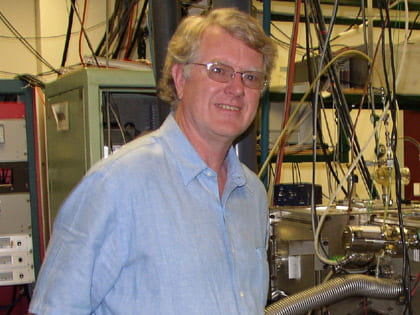Building an eco-friendly Empire
New student sustainable science team makes its mark in Western Riverside.

Breakneck growth followed by a real
estate crash just over the mountains from Orange County
is giving UC Irvine doctoral students a chance to grapple with issues like
traffic, open space and energy consumption.
Those elements are closely linked in
the Inland Empire, as Riverside and San Bernardino counties
are called. Almost half the 860,000 homes there are now worth less than the
amount owed on their mortgages, say economists. Officials fear that newly
arrived middle-class residents may already be fleeing for greener pastures with
shorter commutes and better jobs. Members of the UCI Environment Institute’s Sustainability Science
Team say there’s reason for concern.
“All you see out there is ‘For
rent,’ ‘For rent’ – and, yes, ‘In foreclosure’ too,” says Alexis Hickman, a
planning, policy & design grad student in the interdisciplinary group,
which each year is expected to tackle a real-world project related to
sustainability.
She and her colleagues are working
with mayors, city council members and other leaders in western Riverside County to incorporate more environmentally
sound practices in future planning, which can be a challenge even when times
are good. “Everybody’s going through economic difficulties, but they’re on the
extreme end,” says Sarah Lyon, who’s pursuing a doctorate in accounting. “So
how do you make the environmentally sustainable option the economically
feasible option as well?”
Danielle Tinkoff, a comparative literature grad
student whose expertise in crafting written materials is integral to the team’s
success, says: “Right now we’re trying to figure out how to balance the two.
How do you infuse economic growth with awareness of available natural
resources, such as fresh water?”
Rick Bishop, executive director of
the Western Riverside Council of
Governments – which comprises 17 cities, county government and two water
districts – says: “The bottom line in sustainability is: How are we going to
accommodate another million people? The environment is going to play very
strongly into it. Open space and clean air – in my mind – are most important
because, frankly, we don’t have an ocean, like coastal counties do.”
Sustainability Science Team members have attended
WRCOG committee meetings looking at transportation, energy, water and other
needs and are helping gather data on everything from types of power consumption
to rates of recycling. For instance, there are several electric
utilities, private and public. Collecting comparable data on power usage is
critical if energy-efficiency targets are to be set and met.
They next will establish usage
baselines and other goals aimed at conserving and even marketing natural
resources as growth occurs and load them into an interactive computer program
that will allow officials to track how they’re doing. In the fall, the students
hope to hold a daylong workshop reviewing all the work.
Critical to their success is the
interdisciplinary expertise of team members – such as a planner’s take on
improving education or an engineer’s advice on how to realistically integrate
solar power into the energy supply.
Hickman elaborates: “Usually, it’s
planning students sitting around telling each other, ‘Yeah, that’s a great
idea,’ whereas a materials engineer is going to say, ‘You can’t have that
substantial a reliance on solar panels, because solar power isn’t 100 percent
reliable.’”
Sasha Richey, an engineer
specializing in water resources, adds, “As a hydrologist, I’m used to
the physical perspective, but being part of this team helps me step out of my
intellectual comfort zone and value concepts such as rhetoric and economic
feasibility.”
Environment Institute director Michael Prather
says, “The range of schools involved is representative of the know-how needed
to address the complex challenges of building a sustainable lifestyle whose
demands do not rapidly deplete the world’s natural resources.”
Created in 2008, the institute studies
the relationship between society and the environment. It also promotes academic
collaboration among UCI schools and departments through faculty
recruitment and interdisciplinary research grants, and it sponsors public
events for sharing findings and encouraging action.
Doctoral students interested in
joining the institute’s 2011 Sustainability Science Team should check the website
for new application information in the next few weeks. The deadline is
mid-June.
